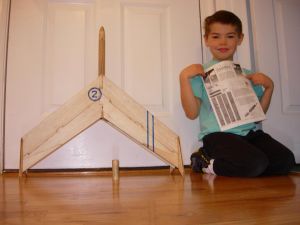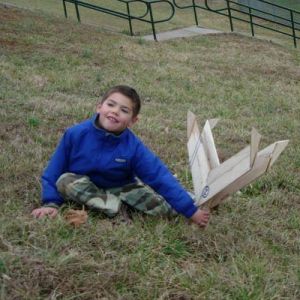Edmonds Aerospace Geminee Thunder
Edmonds Aerospace - Geminee Thunder {Kit}
Contributed by Hank Helmen
| Construction Rating: | starstarstarstar_borderstar_border |
| Flight Rating: | starstarstar_borderstar_borderstar_border |
| Overall Rating: | starstarstarstar_borderstar_border |
| Manufacturer: | Edmonds Aerospace |
Brief:
The Edmonds Geminee Thunder is a twin glider with a single 24mm rear engine.
The gliders are supposed to boost up on D12-3 and then separate using the
ejection charge. Glider should then circle slowly back to earth!
Construction:
Included in the kit is one balsa nose cone, one balsa "plug" (to join
the glider body tubes), two 25mm body tubes, four sheets of 1/4" laser cut
balsa parts, a chunk of clay, and a 3/16" launch lug. The balsa is very
light weight (soft).
Geminee's instructions consist of two 8-1/2" X 11 notebook sized pages black and white printed on both sides with good diagrams. I found the gliders easy to build, but I have built many R/C airplanes and rockets before.
Instructions are OK but more information would really help this kit. The engine mounting details and the glider testing department are lacking. There was no instruction as to how to prepare the engine mount other than "use masking tape to tape the engine in tightly". Also the instructions did not tell that the engine stays in the second glider during the recovery glide, and therefore should be test flown with a spent engine casing in place.
The instructions that are there are easy to follow. The fit of laser cut parts is good. The only special tool that you need is a true flat surface large enough to accommodate the 23 1/2 inch wing span of this beast! I used a vertical milling table and weighted the 1/4" balsa down to keep it perfectly flat.
Finishing:
There is no guidance in the instructions as to how to paint or finish the
model. I assume this is because if you want maximum glide performance, you need
light weight. Testors spray paint or most any other typical paint will add a
whole lot of weight to these big wings and change the center of gravity
drastically.
Competitive rocketeers know that painting boost gliders hinders performance so they don't do it! I chose to give the Geminee two coats of Aerogloss clear dope thinned 50% in order to give it more strength and help protect it from wet grass, etc. I also used bright permanent markers to aid in tracking and recovery. There are no decals in the kit. Titebond yellow carpenters glue was used for wing and fin joining.
Construction Rating: 3 out of 5
Flight:
The only recommended motor is the D12-3. Preparation is easy, just stick the
engine in and insert your igniter. No wadding is required.
On my first and only launch the gliders began straight on lift off but after about 40 feet up began to arch over toward St. Louis! Under full engine power the Geminee nosed straight down into terra firma! The engine then ejected with a very sharp and loud "boom!" The engine casing may have flown higher than the gliders! I used a 24mm C11-3 for the first flight. I'm not sure if this affected the flight. Perhaps the D12 would have accelerated faster and given a straight boost? I dunno. Once again there are no troubleshooting flight tips in the instructions such as what type of launch rod to use or what size engine not to use, etc.
Recovery:
There is no shock chord on this model. All of the balsa is very lightweight
1/4" stock.
Luckily the ground was soft from recent rain and the only damage was that the nose cone was pushed in flush with the front body tube along with a lot of mud.
I'm thinking that I should have used a larger diameter and perhaps longer launch rod. I used only a 36" long 1/8" diameter rod. I think this thing needs to get some speed up for dynamic stability before letting it go free.
For some reason I took the upper glider and gave it a "test glide" after pulling it out of the dirt. The forward part of the fuselage snapped in two where it joins the body tube on landing again, right along the grain. This was the second or third time this had happened. Repair was easy and I plan to fly this thing again as soon as we get a calm day and I have the time.
Flight Rating: 2 out of 5
Summary:
This is a pretty good kit but it needs some improvement in the instructions
department. The main PRO of the Geminee Thunder is of course its size and
excitement of twin gliders floating down.
The CONs are that the instructions should give more information on test gliding in tall grass to verify center of gravity of each glider. They also need more information on how the engine should be mounted and how the glider uses the ejection charge to separate therefore the engine must remain in place during the entire flight. The fuselage balsa should to be stronger, I have used 1/2" Carbon Fiber Laminate "tape" from Hobby Lobby International to reinforce my fuselage sides where they join the glider body tubes.
Overall Rating: 3 out of 5
Other Reviews
- Edmonds Aerospace Geminee Thunder By Frank G. Whitby
Brief: Geminee Thunder is an upscale version of the Edmonds Geminee twin glider. Construction: As with other Edmonds gliders, the kit comes complete with detailed instructions and well designed, precision cut balsa parts ready to be assembled. All of the parts were in perfect condition and high quality balsa was used throughout. The assembly was very simple. Rob Edmonds ...
 |
 |
Flights
Date | Flyer | Rocket | Altitude |
|---|---|---|---|
 |
 |
H.W.H (March 11, 2006)
Sponsored Ads
 |
 |
















H.W.H. (January 28, 2006)